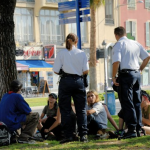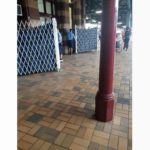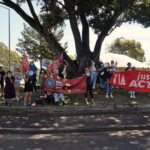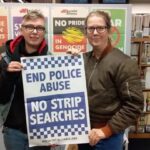“Police Powers Are Bleeding Out”: Redfern Legal Centre’s Sam Lee on the Strip Search Class Action
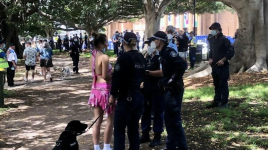
The long-awaited strip search class action was filed in the Common Law Division of the NSW Supreme Court on 21 July.
The proceedings will cover all music festival attendees, who’ve registered and been subjected to a suspect strip search at events held in this state since July 2016.
Going back a decade ago, festivalgoers in NSW did not have to factor in a potential strip search when going out. However, over the succeeding years, the NSW Police Force has dramatically escalated its use of this invasive practice on the street and at events.
“Specific complaints and anecdotal information” led the state police watchdog, the Law Enforcement Conduct Commission (LECC), to launch an investigation in October 2018 to ascertain whether local officers have been adhering to the laws and protocols governing the procedure.
This inquiry resulted in the 2020 LECC strip search report, which found that not only were police breaching protocols regularly, but the incidents described in its pages, which involve teenagers being instructed to strip off in front of armed officers, are likely having a traumatising effect.
En masse traumatisation
Redfern Legal Centre has been one of the most vocal critics of the heightened use of strip searches by NSW police.
Indeed, it commissioned a 2019 UNSW report, which found that the strip search protocols within the legislation are so vague that officers are regularly applying them in a likely illegal manner.
Part 4 of the Law Enforcement (Powers and Responsibilities) Act 2002 (NSW) (the LEPRA) contains the laws governing the practice. And section 31 stipulates that outside of a station, strip searches must only be applied when “the seriousness and urgency of the circumstances” necessitate it.
Bowing to community pressure, NSW police released its Personal Search Manual in September 2019, which indicates that despite not appearing in the LEPRA, officers are being advised that they can order search subjects to lift testicles and breasts, part buttock cheeks and tell them to squat down.
Strip searching individuals, along with the ongoing trauma it results in, has long been likened to sexual assault. And this impact is coupled with no solid law enforcement outcome from applying these searches, as figures show they turn up no illegal items two-thirds of the time.
Unlawful searches
The Redfern Legal Centre and Slater and Gordon have teamed up to run the class action. The community legal centre and the law firm are continuing to call on all festivalgoers who might have been subjected to an unlawful search since mid-2016 to register for the case.
In terms of what an illegal search might further look like, RLC underscores that it can include situations when a person isn’t asked to remove all their clothes, but an officer requests to see their bra or underwear, looks inside them, or they run their finger around the edges of clothing.
Sydney Criminal Lawyers spoke to Redfern Legal Centre senior police accountability solicitor Samantha Lee about the impact incorporating strip searches into the daily lives of those who live in NSW is having on the public and the fact that the pandemic hasn’t curbed their use.
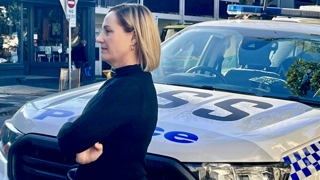
The class action on behalf of people claiming to have been illegally strip searched by NSW police at state music festivals since July 2016 has been filed with the Supreme Court.
Sam, more broadly, what’s entailed in the class action?
It entails sorting out group members. So, getting as many people as possible included in that class action.
We are still calling for those who have attended any music festival in NSW, over the past six years, and have been strip searched by NSW police to come forward and register for the class action on the Slater and Gordon website.
Then we have a directions hearing on 8 September, and we will continue on moving through the judicial system.
NSW police has been increasing its use of strip searches at events over the last half decade. Its stated purpose is to curb drug use, but Redfern Legal Centre asserts this aim isn’t being achieved.
Sam, how would you describe the impact strip search operations are having on the public?
You would describe the actions of police more as a fishing expedition rather than strategic policing.
What we see through the statistics is that the majority of strip searches find absolutely nothing and have a deep traumatic impact on those who are searched. That’s any gender.
It causes a lot of shame. Through taking instructions from people, I find that many don’t share their experience, especially with their parents, because they were strip searched on the basis of drug possession.
It causes very deep trauma. And I’m hoping this class action will seek damages for those who are traumatised but also send a really strong message to police that this type of action is antiquated, inappropriate and outdated.
The class action was delayed because of the pandemic. Lockdown measures over recent years had put a stop to festivals and the large police operations at them.
So, has the pandemic resulted in a reduction in the application of strip searches?
We do have some statistics coming through soon about the number of strip searches during the COVID period. They might be out this week.
What we will find is strip searching behaviour hasn’t changed that much during the pandemic.
What this indicates is that we need legislative change to make a real indent on the number of strip searches occurring across NSW.
So, on the street searches weren’t reduced during the lockdown period?
That’s right. The statistics will reveal that even though music festivals weren’t occurring, strip searches were still up in the high numbers.
Redfern Legal Centre asserts that the wording of strip search protocols need an overhaul, so that what’s permitted during such searches is clearly defined.
Certain practices used on the ground, such as squatting and coughing, don’t appear in the legislation but are included in police standard operating procedures.
The discrepancies between what’s happening on the ground and the laws governing strip searches are stark. So, why is the NSW Police Force so determined not to alter its operations in line with the law and community wants?
It’s a good question, and one I ponder regularly. One thing is there is years of cultural training in NSW police that has made this behaviour routine and acceptable.
Two is that there was a quota system around personal searches for a long time, which has set a very bad practice standard around NSW police.
And three, it seems tough on crime. But really when you do look at the results very little of these searches end up with charges for high-end supply.
So, if you look at the statistics, police aren’t achieving much through this practice, and there could be a better way of dealing with drug supply, rather than engaging in this fishing expedition that causes a lot of harm.
Your community legal centre has also launched a judicial review with the Supreme Court involving the imposition of COVID fines in a manner that breached the public health orders governing them.
The proceedings involve three individuals who question the circumstances in which they were issued with a COVID fine.
These two cases cover very different matters. But if we consider both together, what does it tell us about how NSW police is operating?
We’ve taken these actions because we believe police powers are bleeding out in this state, and the culture has vastly moved away from community policing to punitive policing.
This is causing harm on the ground. And it really does impact most upon those who are most disadvantaged, while those who are already policed are just policed more.
It’s time to think about whether another Royal Commission is needed in NSW to look at how much the powers are going beyond the legislative framework and the cultural demise of the police force in NSW over the last few years.
Whether this is coming from the top down or bottom up or in the middle, I’m not sure. But it really does need reeling in.
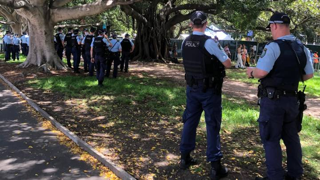
And lastly, Sam, the Redfern Legal Centre has been vocal in its critique of the way NSW police has been applying strip searches for many years. The class action is about bringing justice for the plaintiffs affected by police operations.
But in terms of the impact of the legal proceedings, what else would you like to see achieved by the case outcome?
The other main thing we would like to achieve is that the court provides some clarity around the legislation and the meaning of the term “serious and urgent” to ensure that strip searches are only used in the most exceptional of circumstances.
We are of the view that strip searches were never intended to deal with the suspicion of minor drug possession.
You could see them being used for high-end supply or suspicion of a weapon. But it is hard to see where a general search couldn’t be the main port of call anyway.
We want some clarity around the legislation. As you said, squatting and coughing is not in the legislation, and it clearly says that a cavity search is not allowed. But what is squatting and coughing other than a cavity search?
So, definitions around what is a cavity search is needed. It’s pretty obvious. But it needs to be clarified to police.
We want to see that strip searches are not used on minors, unless a court order is obtained in the most exceptional circumstances.
If you cut out strip searching for minor drug possession, you’d see a huge number of strip searches removed overnight.


